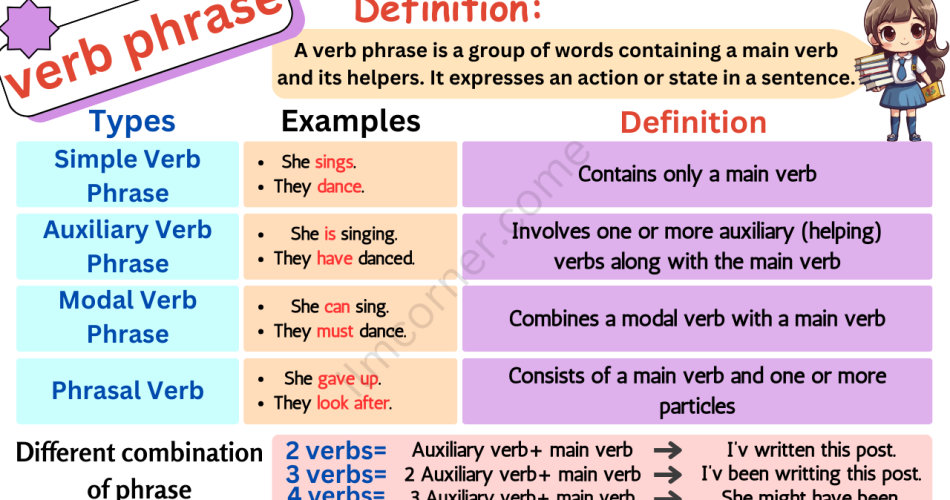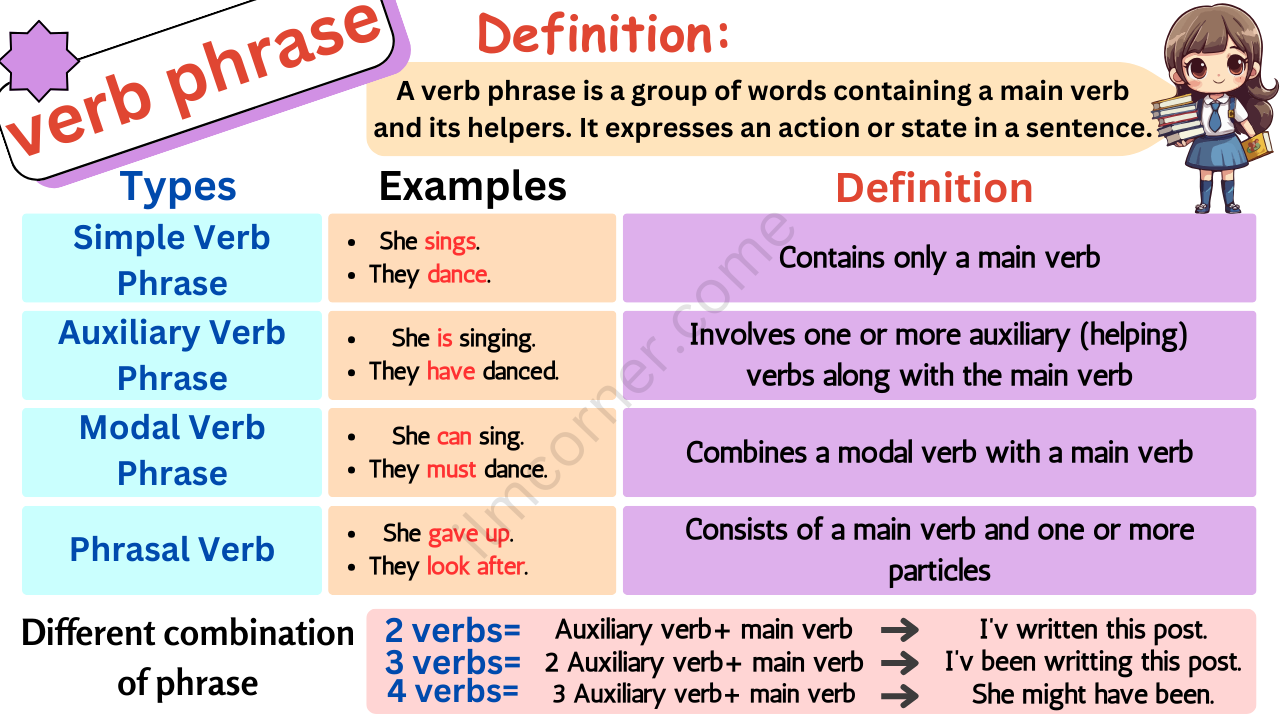In English, when we talk, we use special groups of words to show actions or states. One important group is called a Verb Phrase. It’s not just one action word; it’s a team of words working together. The main leader in this team is the main verb. It tells us the main action or state. Alongside, there are friends called auxiliary verbs. They help to show when things happen or add extra details. For instance, you might say, “I am playing,” or “She will sing.” Here, “playing” and “sing” are the main verbs, and “am” and “will” are the helpers. Together, they create a verb phrase. Understanding these phrases helps us express ourselves clearly and share when actions occur. As we explore the world of verb phrases, we unravel the secrets of effective communication in English.
Examples of Verb Phrase:
Here’s a list of sentences with examples of verb phrases:
- She walked to the store.
- The students are studying for exams.
- We will meet at the cafe.
- The cat is playing with a ball.
- He has been working hard all day.
- They were singing in the choir.
- I can swim in the pool.
- The bird is building a nest.
- She should have finished her homework.
- We were waiting for the bus.
- He played the guitar beautifully.
- The flowers have bloomed in the garden.
- The team is practicing for the match.
- The children will be attending the workshop.
- She baked a delicious cake.
- The sun sets behind the mountains.
- They have explored the ancient ruins.
- The baby is sleeping peacefully.
- We were watching a thrilling movie.
- She reads novels before bedtime.
How to Identify Verb Phrase?
Identifying a verb phrase is like discovering a team of words working together in a sentence to describe an action or state. Start by finding the main action, which is the main verb, like “reading” in the sentence “She is reading a book in the park.” Look out for helper words, or auxiliary verbs, such as “is,” and notice if there are extra details, like “a book in the park.” When you see the main verb, helpers, and extra details grouped together, that’s your verb phrase! It’s a team effort of words, combining to tell us more about what’s happening in a sentence.
Structure of Verb Phrase:
Imagine a verb phrase as a team of words working together in a sentence. The main player is the main verb, showing the main action or state. For instance, in “She is reading,” “reading” is the main verb. But there are also helper players called auxiliary verbs like “is” or “will.” They assist the main verb. So, in “She is reading,” “is” is the helper. Sometimes, extra words join the team, like words describing where or how. In “She is reading a book,” “a book” is the extra part, telling us what she is reading. The team structure looks like this:
Auxiliary Verb(s)+Main Verb + Additional Words
Understanding this helps us make sentences that express actions or states more clearly!
Types of Verb Phrase:
Here are some common types of verb phrases:
1. Simple Verb Phrases:
- Definition: Consists of just the main verb without any additional helping verbs.
- Example: She runs every morning.
- He sings beautifully.
- They laughed loudly.
- The baby cries often.
- She dances gracefully.
- The sun sets in the evening.
2. Complex Verb Phrases:
- Definition: Involves one or more auxiliary (helping) verbs along with the main verb.
- Example: They have been studying for hours.
- We have been waiting for the bus.
- She will be studying abroad next year.
- They had finished their homework before dinner.
- He is playing his guitar at the concert.
- I have been practicing the piano daily.
3. Verb Phrases with Adverbial Phrases:
- Definition: Includes an adverbial phrase that provides information about when, where, or how the action is taking place.
- Example: We will meet at the park tomorrow.
- She will meet you at the cafe.
- They run in the park every morning.
- We swim in the pool during summers.
- He walks his dog along the beach.
- The event takes place on the weekend.
4. Verb Phrases with Prepositional Phrases:
- Definition: Involves a prepositional phrase providing additional details about the action.
- Example: The book is on the shelf.
- The cat is on the roof.
- They played in the backyard all day.
- She reads her books under the tree.
- The children are playing on the playground.
- He found the keys inside the drawer.
5. Verb Phrases with Direct Objects:
- Definition: Incorporates a direct object, showing the receiver of the action.
- Example: He ate lunch quickly.
- She ate a sandwich.
- We bought a new car.
- He painted the fence.
- They built a sandcastle.
- The chef prepared a delicious meal.
6. Verb Phrases with Adjective Phrases:
- Definition: Contains an adjective phrase providing more information about the subject or object.
- Example: The flowers have bloomed in the garden.
- The flowers bloomed in vibrant colors.
- The car is very reliable.
- He wore a suit elegantly tailored.
- The book is incredibly interesting.
- The movie was highly entertaining.
7. Verb Phrases with Infinitives:
- Definition: Involves an infinitive verb (to + base verb) in the phrase.
- Example: She wants to learn French.
- She wants to travel the world.
- He hopes to succeed in his career.
- We decided to visit the museum.
- They plan to start a new business.
- I love to read science fiction.
8. Verb Phrases with Gerunds:
- Definition: Incorporates a gerund verb (verb + -ing form) in the phrase.
- Example: Swimming is his favorite activity.
- Swimming is good exercise.
- They enjoy baking cookies.
- Running keeps him healthy.
- Painting relaxes her after work.
- I appreciate listening to music.

